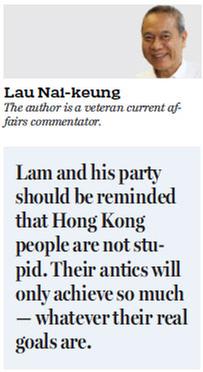Balanced budget does not mean frugal government

Hong Kong has for a long time adopted the principle of "small government" to the extent that financial secretaries both before and after the handover of sovereignty often alluded to this "big market, small government" doctrine in their annual budget speeches. Public spending is supposed to be in line with economic growth, so public spending as a percentage of GDP stays at about 20 percent.
Recently former chief executive of the Hong Kong Monetary Authority and current Executive Council member Joseph Yam Chi-kwong criticized this conservative mentality. In an article "Public Finance in Hong Kong" published on his personal blog, he remarked that the "miserly" fiscal policy of the past decade had put a drag on the city's economic development. Chief Executive Carrie Lam Cheng Yuet-ngor recently echoed Yam's view, saying the provision in Article 107 of the Basic Law on fiscal management should not be interpreted rigidly. Budget balance should of course be maintained but that should be over the entire economic cycle, so deficits during times of economic weakness should be made up for by surpluses during economic booms.
Given that fiscal surpluses have been recorded over the last 13 fiscal years, it does appear that our previous budgets had been over-conservative. But fiscal sustainability should nevertheless be maintained. I just read a commentary to the effect that Lam's new fiscal policy should start with the universal public pension plan, alternative versions of which were proposed by Professor Nelson Chow and a group of mainly social-work scholars. Economists looked at both versions with suspicion, arguing that such "Pay as You Go" plans may not be fiscally sustainable and proposals to unload the burden on the business sector as extra profit taxes will undermine Hong Kong's competitiveness.

I would like to stress four key principles of fiscal policy, and the implications for policy in practice.
First, sustainability. Fiscal sustainability is best understood as budget balance over the cycle, which would disallow secular accumulation of fiscal surplus or government debt. Fiscal sustainability should be assessed and ensured with proper mechanisms. Simply spelling out some assumptions and indicating sustainability under those assumptions is just not good enough. I would recommend that there be an objective assessment about fiscal sustainability by an independent committee made up of well-trained fiscal policy experts. This will take the pressure away from the government if the proposal is popular and yet rejected.
Second, social benefit. Social benefit means any policy initiative must be justified by evidence that the social benefit is bigger than social cost. If an infrastructure or a policy brings in net gains in social benefit, the government should feel comfortable financing it, even though this may mean higher taxes or fees.
Third, efficiency and competitiveness. It should be noted that taxes generally would undermine competitiveness and may hurt efficiency. These days governments around the world are working hard to reduce taxes on profits in order to lure or retain investment. Today Hong Kong's 16.5 percent profit tax rate is no longer as attractive as before, since most jurisdictions have cut their tax rates and have also introduced many allowances and tax holidays. Already Hong Kong faces a decline in the number of regional headquarters for transnational companies.
Fourth, fairness. Hong Kong people have reasons to complain against unfairness when they see tycoons collecting hundreds of millions of dividends tax-free, and capital gains are also completely tax-free. The present arrangement seems justified since dividends are supposed to be paid from profits after tax but it is very difficult to convince the public that this is fair. Moreover, dividends may sometimes be paid from loans or funds raised in the capital market. Hong Kong people are not by nature hateful of the rich but they may grow suspicious of the government for being pro-rich and unfair. In order for the government to have public support, our tax policy should also be seen to be fair. The fact that both London and New York, the two top global financial centers, have taxes on capital gains should convince us that a well-designed tax on capital gains need not undermine our competitiveness as a global financial center.
Of all these principles, social benefit may be the most controversial. Social benefit refers to the public interest. Is it socially beneficial to spend more on drugs, so those who suffer from rare diseases can have access to expensive drugs that have been demonstrated to be effective? I would argue yes. I view the public interest through a thought experiment. Let us imagine that we or our loved ones could be hit by these rare diseases, would we support the increased spending? The fact that the Hospital Authority acting as a buyer has stronger bargaining power in negotiating drug prices with drug companies also supports the notion that we should spend the extra dollars. This is one important, though small step, to building a compassionate society.
(HK Edition 08/15/2017 page8)
Today's Top News
- Dutch govt urged to mend chip dispute
- Macao's heritage sites hold special appeal for games
- China tackles N2O emissions, leading change
- AI should build a future where technology serves people
- Japan bears blame for worsening China ties
- People-centered outlook applauded






























